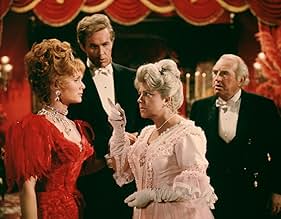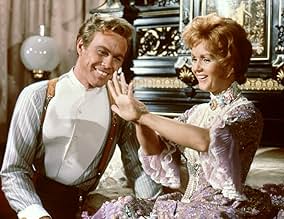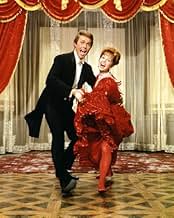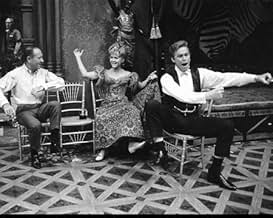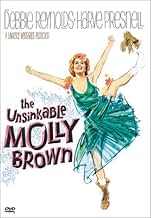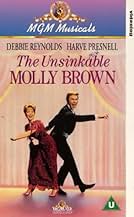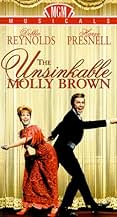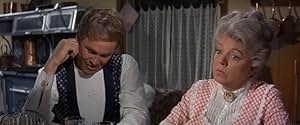CALIFICACIÓN DE IMDb
6.6/10
4.5 k
TU CALIFICACIÓN
Una montañesa pobre y sin educación abandona su cabaña en busca de respeto, un marido rico y una vida mejor en esta película biográfica ficticia sobre Margaret "Molly" Brown, quien sobrevivi... Leer todoUna montañesa pobre y sin educación abandona su cabaña en busca de respeto, un marido rico y una vida mejor en esta película biográfica ficticia sobre Margaret "Molly" Brown, quien sobrevivió al hundimiento del Titanic en 1912.Una montañesa pobre y sin educación abandona su cabaña en busca de respeto, un marido rico y una vida mejor en esta película biográfica ficticia sobre Margaret "Molly" Brown, quien sobrevivió al hundimiento del Titanic en 1912.
- Dirección
- Guionistas
- Elenco
- Nominado a 6 premios Óscar
- 5 premios ganados y 13 nominaciones en total
- Dirección
- Guionistas
- Todo el elenco y el equipo
- Producción, taquilla y más en IMDbPro
Opiniones destacadas
6B24
I had the pleasure of accompanying my great aunt and one of her contemporaries to the opening of this movie in Denver in 1964. Because they had known the old girl herself (the real Mrs. Margaret Brown, that is) back in the early years of the century, both in Leadville and Denver, they were keen on seeing what Hollywood and Debbie had done with the story.
I remember vividly watching their reactions turn from initial pleasure with the opening number to puzzlement when Debbie started to chew the scenery and behave like, well, Debbie Reynolds. This was followed by Ed Begley and the boys in the saloon hooting it up, and the two old ladies next to me started to frown a bit and whisper something to the effect that "it was not like that at all." They were becoming quite restless until the Denver bits began, but they seemed to accept the remainder of the story with a good deal of resignation that it was all just good fun and nonsense, and wasn't that what going to the movies was all about?
Afterward, as we strolled over to the Brown Palace for dinner, they regaled me with a complete history of the real Mrs. Brown and the many mutual friends they had enjoyed meeting at that same venue from roughly 1895 to 1915 when they were themselves just being presented into Denver society. I learned, among other things, that Mrs. Brown was considered an eccentric but generally well-liked and articulate woman who, despite never really being accepted at the toniest levels, became a legend in her own time after the Titanic episode. That part of the story was not only true, but actually a larger-than-life experience, the details of which they agreed should have been featured more profoundly in the film version.
The next time I drove down Wadsworth Blvd. and saw Mrs. Brown's "Summer House," a rather grand Victorian edifice like the better known one in the center of Denver, I tried to picture Debbie Reynolds in that setting and could not quite fit the two together. That in spite of the fact that Debbie herself grew up in El Paso at the southern end of the same Rocky Mountains that rise northward through Colorado.
I remember vividly watching their reactions turn from initial pleasure with the opening number to puzzlement when Debbie started to chew the scenery and behave like, well, Debbie Reynolds. This was followed by Ed Begley and the boys in the saloon hooting it up, and the two old ladies next to me started to frown a bit and whisper something to the effect that "it was not like that at all." They were becoming quite restless until the Denver bits began, but they seemed to accept the remainder of the story with a good deal of resignation that it was all just good fun and nonsense, and wasn't that what going to the movies was all about?
Afterward, as we strolled over to the Brown Palace for dinner, they regaled me with a complete history of the real Mrs. Brown and the many mutual friends they had enjoyed meeting at that same venue from roughly 1895 to 1915 when they were themselves just being presented into Denver society. I learned, among other things, that Mrs. Brown was considered an eccentric but generally well-liked and articulate woman who, despite never really being accepted at the toniest levels, became a legend in her own time after the Titanic episode. That part of the story was not only true, but actually a larger-than-life experience, the details of which they agreed should have been featured more profoundly in the film version.
The next time I drove down Wadsworth Blvd. and saw Mrs. Brown's "Summer House," a rather grand Victorian edifice like the better known one in the center of Denver, I tried to picture Debbie Reynolds in that setting and could not quite fit the two together. That in spite of the fact that Debbie herself grew up in El Paso at the southern end of the same Rocky Mountains that rise northward through Colorado.
Debbie Reynolds stars in this boisterous adaption of the Broadway musical, The Unsinkable Molly Brown, based on the life of legendary Denver society woman and heroine of the Titanic disaster. It's a film role perfectly suited to Debbie Reynolds both musically and dramatically.
The Meredith Willson musical ran for 532 performances on Broadway and starred Tammy Grimes there. In the Hollywood tradition though, a movie name was thought to be needed. 1964 was a bad year for Broadway actresses who originated roles and did not get the film role. Julie Andrews also knew exactly how Tammy Grimes felt.
The one big difference is that no one had to dub Debbie Reynolds. Her singing and dancing is all a part of one remarkable role where the character ages and matures and there's a big difference in those two life functions. I'm of the firm belief that MGM cast her in this part because of her musical numbers in How the West Was Won which they also produced. Debbie may also still have been under contract to them from the old days.
Harve Presnell came over from Broadway to play her husband John J. Brown of Leadville, Colorado and who makes them both rich beyond their wildest dreams. But Molly's dreams are larger than John's and it causes their parting. Presnell has a terrific baritone voice and he unfortunately came along at the tail end of movie musicals. His next film was Paint Your Wagon and he got to sing They Call the Wind Maria which requires a real singer to do, not something Lee Marvin or Clint Eastwood could fake. Presnell's developed into a fine character actor though.
Years ago I happened to meet Ed Begley's widow at an event. She mentioned to me that her husband for all the great dramatic parts he played including winning an Oscar for Sweet Bird of Youth was at heart a song and dance man. He loved to get up and perform at parties and such. I said to her that the role of Debbie Reynolds's father in The Unsinkable Molly Brown must have been one he loved and she said it was his favorite. Begley certainly looks like he's having a great old time in the part.
Meredith Willson's score, while not as good as The Music Man still has some fine numbers. Debbie's infectious singing of I Ain't Down Yet is the high point. For Presnell his anthem to Colorado My Home if it isn't, it should be that state's official song.
The only criticism I have of the film is that as good as Molly Brown is here there was so much more to the woman that The Unsinkable Molly Brown doesn't even get into. She was a suffragette, a leader in reform of juvenile offender laws, a noted philanthropist, she wasn't just a party girl who got a chance for heroism on the Titanic. I wish that had been dealt with in the film and the Broadway musical.
For a rollicking good musical experience though, you cannot beat The Unsinkable Molly Brown. No putting this woman or this film down, ever.
The Meredith Willson musical ran for 532 performances on Broadway and starred Tammy Grimes there. In the Hollywood tradition though, a movie name was thought to be needed. 1964 was a bad year for Broadway actresses who originated roles and did not get the film role. Julie Andrews also knew exactly how Tammy Grimes felt.
The one big difference is that no one had to dub Debbie Reynolds. Her singing and dancing is all a part of one remarkable role where the character ages and matures and there's a big difference in those two life functions. I'm of the firm belief that MGM cast her in this part because of her musical numbers in How the West Was Won which they also produced. Debbie may also still have been under contract to them from the old days.
Harve Presnell came over from Broadway to play her husband John J. Brown of Leadville, Colorado and who makes them both rich beyond their wildest dreams. But Molly's dreams are larger than John's and it causes their parting. Presnell has a terrific baritone voice and he unfortunately came along at the tail end of movie musicals. His next film was Paint Your Wagon and he got to sing They Call the Wind Maria which requires a real singer to do, not something Lee Marvin or Clint Eastwood could fake. Presnell's developed into a fine character actor though.
Years ago I happened to meet Ed Begley's widow at an event. She mentioned to me that her husband for all the great dramatic parts he played including winning an Oscar for Sweet Bird of Youth was at heart a song and dance man. He loved to get up and perform at parties and such. I said to her that the role of Debbie Reynolds's father in The Unsinkable Molly Brown must have been one he loved and she said it was his favorite. Begley certainly looks like he's having a great old time in the part.
Meredith Willson's score, while not as good as The Music Man still has some fine numbers. Debbie's infectious singing of I Ain't Down Yet is the high point. For Presnell his anthem to Colorado My Home if it isn't, it should be that state's official song.
The only criticism I have of the film is that as good as Molly Brown is here there was so much more to the woman that The Unsinkable Molly Brown doesn't even get into. She was a suffragette, a leader in reform of juvenile offender laws, a noted philanthropist, she wasn't just a party girl who got a chance for heroism on the Titanic. I wish that had been dealt with in the film and the Broadway musical.
For a rollicking good musical experience though, you cannot beat The Unsinkable Molly Brown. No putting this woman or this film down, ever.
This is not a review, but an inquiry. Does anyone know who the real-life baby was that portrayed Molly as a baby in the beginning of the movie going over the rapids in a cradle? I saw a very old "filler" once on TCM which featured swim instruction for very young children, some as young as 12 months. The instructor had them swimming to the pool bottom to retrieve items as well as racing each other to see who reached the other side first. I believe early swim instruction had gained some measure of popularity in California during the 30s. Most of the footage of the rapids was of a dummy. Other footage was of the baby in a water tank on a sound stage with footage of rapids being shown in the background. The final few seconds of that scene show the cradle overturning very close to shore and spilling the baby out. The baby then swims to shore and crawls out - that part is real. I sure would like to know who that baby was. It was precious!
What a fun movie! Debbie Reynolds does a wonderful job portraying Molly Brown, a poor, uncultured country girl who "makes good," but then finds herself having to fight (none too successfully) for acceptance among the rich crowd she finds herself suddenly thrown into. Always rising when she's down (unsinkable in other words) there's also a sense of discovery involved for Molly, as she finally comes to understand in a wonderfully dramatic moment in an otherwise hilarious film that even among her wealthy and regal European friends she is accepted because they find her amusing, and not because she's really accepted as one of them. The title of the movie, of course, comes specifically from the real-life Molly Brown's experience in surviving the Titanic disaster, as she returns home after making this discovery.
Yes, the movie is undoubtedly full of tall tales. But it's full of wonderful songs (Harve Presnell as Johnny Brown has a marvellous singing voice), pretty good acting and just a general sense of fun. Well worth the watching.
Yes, the movie is undoubtedly full of tall tales. But it's full of wonderful songs (Harve Presnell as Johnny Brown has a marvellous singing voice), pretty good acting and just a general sense of fun. Well worth the watching.
I don't know what it was, but I couldn't really get into this movie, be affected by it or enjoy it very much. Well, yeah, the society party scenes were a hoot, the scenery was pretty, the chereography of the "Friend" song was good, but that was about it. The rest was just... there, not horrible, but definitly not above average, either.
Debbie Reynolds should have been very well suited to the role of Molly Brown, but for all her teeth-gritting, yelling, and wailing, she just doesn't rise to the occasion. Why this is often considered her best role, and why she was nominated for an Oscar for it, I really couldn't tell you. Harve Presnell has a soaring voice, but again, just is average. The Merideth Willson score is rather pedestrian. (Apparently several songs were cut from the Broadway show; maybe they were better.) But really, this guy did The Music Man? And the Titanic sinking is done and dispensed with in maybe two minutes, if that. Come on! The one reason this musical was made was because of Mrs. Brown's legendary courage after that sinking. Not much evidence of that here. Oh, and yes, the musical is pretty accurate in terms of the many legends surrouding Margaret Brown, but not so faithful to the real person. (Many minute things: she was never rescued from a flood as a baby, she was actually born and raised in Hannibal, Missouri, her husband was always called J.J., never Johnny, they never really did reconcile, she actually had two children with him that were not mentioned, she never really was accepted by the Sacred Thirty-Six, her many contributions to the juvenile and suffrage movements were ignored as always, etc. and so forth. She was never even called Molly, always Margaret.) You get the point...
It simply wasn't anything special.
Debbie Reynolds should have been very well suited to the role of Molly Brown, but for all her teeth-gritting, yelling, and wailing, she just doesn't rise to the occasion. Why this is often considered her best role, and why she was nominated for an Oscar for it, I really couldn't tell you. Harve Presnell has a soaring voice, but again, just is average. The Merideth Willson score is rather pedestrian. (Apparently several songs were cut from the Broadway show; maybe they were better.) But really, this guy did The Music Man? And the Titanic sinking is done and dispensed with in maybe two minutes, if that. Come on! The one reason this musical was made was because of Mrs. Brown's legendary courage after that sinking. Not much evidence of that here. Oh, and yes, the musical is pretty accurate in terms of the many legends surrouding Margaret Brown, but not so faithful to the real person. (Many minute things: she was never rescued from a flood as a baby, she was actually born and raised in Hannibal, Missouri, her husband was always called J.J., never Johnny, they never really did reconcile, she actually had two children with him that were not mentioned, she never really was accepted by the Sacred Thirty-Six, her many contributions to the juvenile and suffrage movements were ignored as always, etc. and so forth. She was never even called Molly, always Margaret.) You get the point...
It simply wasn't anything special.
¿Sabías que…?
- TriviaAs with most Hollywood biopics, there are liberties taken with the real story, most notably in that Margaret (Molly) and J.J. never reconciled. They separated in 1909, although they remained good friends who cared deeply for each other until his passing. She was also not quite the social outcast depicted in the film. Other aspects of her life that were missing from the movie: they had two children, a son and daughter. Margaret Brown was a passionate social crusader and philanthropist; she was a champion of women's rights, including education and the vote. She championed workers' rights, historic preservation, education and literacy, and child welfare, including helping to found the modern juvenile court system. After the sinking of the Titanic, she was noted for her efforts to commemorate the heroism of the men aboard the ship. After WWI, she helped to rebuild France and to aid wounded soldiers, and received the French Legion of Honor. She also ran twice for the U.S. Senate. She died in 1932.
- ErroresWhen Molly first meets John, in the 1880s, they look at some picture postcards she has with her. The picture occupies one entire side of each card, but postcards of this type were not available in the USA until 1907.
- Citas
Molly Brown: Nobody wants to see me down like I wants to see me up.
- Créditos curiososintroducing Harve Presnell
- Versiones alternativasIn the past, TCM has shown a version with Overture and Exit Music that ran 135 minutes. It also had a slightly different aspect ratio.
- ConexionesEdited from Y el mar los devoró (1953)
- Bandas sonorasOverture (Belly Up to the Bar, Boys/I Ain't Down Yet/I'll Never Say No/Colorado, My Home)
(uncredited)
Music and Lyrics by Meredith Willson
Performed by Robert Armbruster and The MGM Symphony Orchestra (as the MGM Studio Orchestra)
Selecciones populares
Inicia sesión para calificar y agrega a la lista de videos para obtener recomendaciones personalizadas
Detalles
- Fecha de lanzamiento
- País de origen
- Idioma
- También se conoce como
- The Unsinkable Molly Brown
- Locaciones de filmación
- Productora
- Ver más créditos de la compañía en IMDbPro
Taquilla
- Total en EE. UU. y Canadá
- USD 13,167,200
- Tiempo de ejecución2 horas 8 minutos
- Color
- Relación de aspecto
- 2.35 : 1
Contribuir a esta página
Sugiere una edición o agrega el contenido que falta


